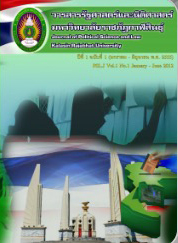นโยบายการพัฒนาคุณภาพชีวิตผู้สูงอายุขององค์กรปกครองส่วนท้องถิ่นในเขตจังหวัดภาคตะวันออกเฉียงเหนือ
DOI:
https://doi.org/10.14456/gjl.2012.6คำสำคัญ:
การพัฒนาคุณภาพชีวิตผู้สูงอายุ, สังคมผู้สูงอายุ, ผู้สูงอายุ, องค์กรปกครองส่วนท้องถิ่น, Development for Quality of Life of the Elderly, Elderly Society, Elderly, Local Administrative Organizationบทคัดย่อ
วัตถุประสงค์ของการวิจัยในครังนี้คือ 1) เพื่อศึกษาการก่อตัวของนโยบายการ พัฒนาคุณภาพชีวิตผู้สูงอายุขององค์กรปกครองส่วนท้องถิ่น 2) เพื่อศึกษาการนำนโยบายการพัฒนาคุณภาพชีวิตผู้สูงอายุขององค์กรปกครองส่วนท้องถิ่นไปปฏิบัติ 3) เพื่อศึกษาผลกระทบจากการนำนโยบายการพัฒนาคุณภาพชีวิตผู้สูงอายุขององค์กร ปกครองส่วนท้องถิ่นไปปฏิบัติ 4) เพื่อศึกษาผลของการนำนโยบายการพัฒนาคุณภาพ ชีวิตผู้สูงอายุขององค์กรปกครองส่วนท้องถิ่นไปปฏิบัติพื้นที่ในการศึกษาวิจัยคือองค์กร ปกครองส่วนท้องถิ่นในเขตจังหวัดนครราชสีมาชัยภูมิและบุรีรัมย์การเก็บข้อมูลใช้วิธี วิจัยเชิงคุณภาพเป็นหลักร่วมกับการเสริมด้วยวิธีวิจัยเชิงปริมาณโดยการวิจัยเชิง คุณภาพได้คัดเลือกเฉพาะองค์กรปกครองส่วนท้องถิ่นที่ได้รับรางวัลการบริหารจัดการ ที่ดีแหล่งข้อมูลคือ 1) สัมภาษณ์เชิงลึกผู้เกี่ยวข้องโดยตรงกับนโยบายการพัฒนาคุณภาพชีวิตผู้สูงอายุจำนวน 55 คน 2) เอกสารและทฤษฎีที่เกี่ยวข้อง 3) การสังเกต แบบไม่มีส่วนร่วมวิเคราะห์ข้อมูลเชิงคุณภาพใช้วิธีการวิเคราะห์แบบอุปนัยและ นำเสนอผลการวิเคราะห์ข้อมูลเชิงเนื้อหาตามปรากฏการณ์ส่วนวิธีวิจัยเชิงปริมาณได้ คำนวณประชากรกลุ่มตัวอย่างจากนายกองค์กรปกครองส่วนท้องถิ่นทั้งหมดจำนวน 686 คนด้วยสูตรค านวณของ Yamane ที่ค่าความคลาดเคลื่อน + / - 0.05 ภายใต้ ความเชื่อมั่น 95% ได้ขนาดกลุ่มตัวอย่างทั้งสิ้น 252 คนวิเคราะห์ข้อมูลเชิงปริมาณ ด้วยสถิติเชิงพรรณนาผลการวิจัยพบว่า ประการแรกพบว่าการวิเคราะห์ประเด็นเรื่องการก่อตัวของนโยบายการพัฒนา คุณภาพชีวิตผู้สูงอายุที่สามารถเข้าสู่วาระนโยบายขององค์กรปกครองส่วนท้องถิ่น เป็นไปตามกรอบการวิเคราะห์สามกระแสได้แก่กระแสการเมืองกระแสตัวปัญหา กระแสนโยบายและหน้าต่างนโยบายตามตัวแบบของ Kingdon ประการที่สองพบว่าปัจจัยที่ส่งผลต่อความสำเร็จของการนำนโยบายการพัฒนา คุณภาพชีวิตผู้สูงอายุขององค์กรปกครองส่วนท้องถิ่นไปปฏิบัติเรียงตามล าดับ ความส าคัญได้ดังนี้คือ 1) ภาวะผู้น า 2) ทรัพยากรนโยบาย 3) การบริหารจัดการ 4) ความต้องการของผู้สูงอายุ5) ความร่วมมือของหน่วยงานที่เกี่ยวข้อง ประการที่สามพบว่าผลกระทบในด้านบวกคือการนำนโยบายการพัฒนา คุณภาพชีวิตผู้สูงอายุไปปฏิบัติจะทำให้คุณภาพชีวิตผู้สูงอายุดีขึ้นทั้งทางสุขภาพ ร่างกายจิตใจและรายได้ผลกระทบในด้านลบคือปัญหาด้านความจำกัดของ งบประมาณการขาดความรู้ความเข้าใจในเรื่องผู้สูงอายุของบุคลากรในองค์กรปกครอง ส่วนท้องถิ่นรวมทั้งการมีบุคลากรจำนวนน้อยไม่สามารถดูแลผู้สูงอายุได้ทั่วถึงประการ ที่สี่พบว่าองค์กรปกครองส่วนท้องถิ่นประสบความสำเร็จในการนำนโยบายการพัฒนา คุณภาพชีวิตผู้สูงอายุไปปฏิบัติอยู่ในระดับปานกลางและควรปรับปรุงการนำนโยบาย ไปปฏิบัติหลายด้านได้แก่งานด้านงบประมาณการบริหารบุคลากรการจัดทำฐานข้อมูล อย่างบูรณาการและการจัดให้มีเครือข่ายความร่วมมือที่มีประสิทธิภาพ
The purposes of this research were 1) to investigate the formation by Local Administrative Organizations of the northeastern provinces of Thailand of development policy for quality of life of the elderly 2) to study the implementation of policies to improve the quality of life of the elderly 3) to study the results of the policies for elderly quality of life that were carried out by Local Administrative Organizations and 4) to study the effects of the development policy. The areas of research were the Local Administrative Organizations in the provinces of Nakhon Ratchasima, Chaiyaphum and Buriram. Data was collected by qualitative approach and supplemented by quantitative methods. The qualitative research into Local Administrative Organizations managing resources for the elderly was conducted by 1) in-depth interviews with 55 people directly related to development of policies for elderly quality of life, 2) study of documents and related theories and 3) non-participant observation. Qualitative data were analyzed by using inductive analysis, data analysis and presentation of content based on the phenomenon. The quantitative research methods, collected data from the sample of 686 persons, they were the Local Administrative Organizations presidents by using Yamane’s formula. The margin of error was +/- 0.05 under the confidence interval for a total of 252 samples. Quantitative data were analyzed by using descriptive statistics. The results were as follows: Firstly, an analysis of the issues related to formation of development policies for elderly quality of life and the priority these issues received in the policy agenda of Local Administrative Organizations found that these issues were based on the current political power, the current problems facing the elderly and the policy window based on models of Kingdon. Secondly, it was found that the success of the development policy for elderly quality of life was affected by the following factors, in order of importance: 1) leadership 2) policy resources 3) management 4) the needs of the elderly and 5) cooperation with the relevant authorities. Thirdly, it was found that the positive impact of development policy for elderly quality of life was improvement of quality of life through physical health, mental and emotional health and income. The negative impact were in budget constraints, lack of knowledge and understanding of elderly people in Local Administrative Organizations, and a limited personnel was able to care for the elderly community. Finally, it was found that Local Administrative Organizations have succeeded in adopting policies that perform at a moderate level for development of elderly quality of life. The policies should be revised to include aspects of the budget, management of personnel, preparation and integration of the database, and provision of effective networks of cooperation.
Downloads
ดาวน์โหลด
เผยแพร่แล้ว
รูปแบบการอ้างอิง
ฉบับ
ประเภทบทความ
สัญญาอนุญาต
ลิขสิทธิ์ (c) 2017 วารสารการบริหารปกครอง (Governance Journal)

อนุญาตภายใต้เงื่อนไข Creative Commons Attribution-NonCommercial-NoDerivatives 4.0 International License.








